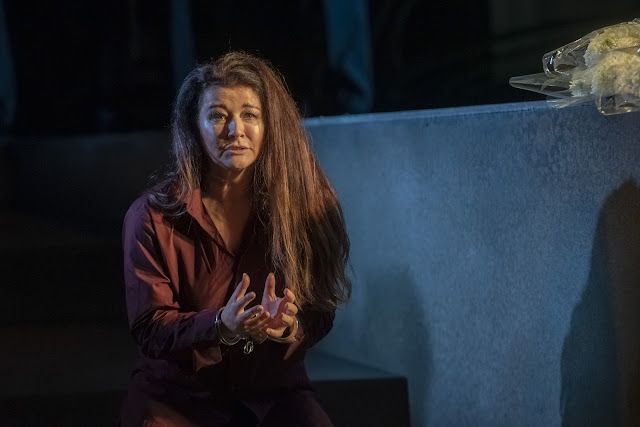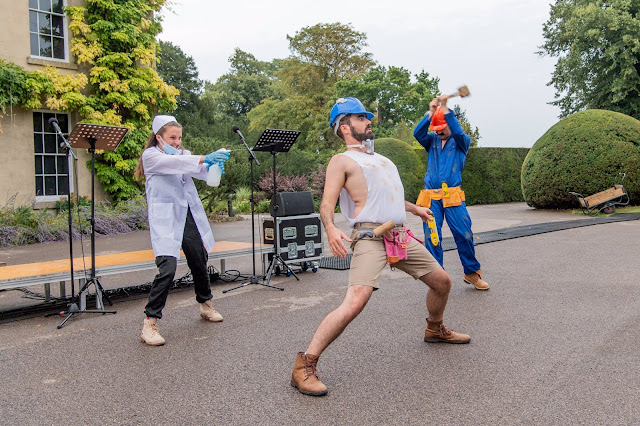 |
| BBC Proms - Nicholas Chalmers & BBC Singers (image from live feed) |
On Friday it was the first of the BBC's live Proms, with Sakari Oramo conducting the BBC Symphony Orchestra and Nicholas Chalmers conducting the BBC Singers. There was no audience, of course, and the orchestra was spread out far more widely than is usual, but in a way which made the players on film far more easy to see. This became an ensemble of individuals rather than a mass. There were some stunning moments, but the programme was somewhat strange with a trio of American-inspired pieces; a new commission from Hannah Kendall, Tuxedo: Vasco ‘de’ Gama, inspired by the American artist Michel Basquiat (1960-1988), Eric Whitacre's Sleep and Aaron Copland's Quiet City, and then Beethoven's Symphony No. 3 'Eroica'.
Both on the radio and on the TV (the concert was broadcast on BBC Two with a 30-minute delay), the announcers spent a lot of time telling us how special the occasion was, rather than letting the music speak for itself. It would have been good to hear more about Hannah Kendall's inspirations for her piece and see more of Basquiat's images. Her piece was striking, full of imaginative textures and a lovely use of rhythm, though it didn't feel very 1980s and I wondered if it might have been better if we hadn't known about the Basquiat connection. Moving from the Hannah Kendall piece to Eric Whitacre's Sleep, sung by the BBC Singers conducted by Nicholas Chalmers, there was a danger of it being something of a non-sequitur. But the simply stunning performances that Chalmers and the singers gave us (all from memory), giving a real edge to Whitacre's harmonies, meant that the short work had great intensity. This somewhat disparate group of pieces finished with Aaron Copland's Quiet City, always a moving piece but here counterpointed with images of cities under lockdown, and again the performance particularly from Alison Teale (cor anglais) and Phillip Cobb (trumpet) simply blew away any concerns you might have had as to why this piece after the Kendall and the Whitacre.
There followed a wonderfully architectural performance of Beethoven's Eroica Symphony, the players giving us strong focussed lines and a terrific sense of Beethoven's structure. This wasn't HIP by a long chalk, but it wasn't late Romantic either, and throughout you sensed the players responding to Oramo's feeling for the work's structure. [BBC iPlayer]
Earlier in the week we caught the TV broadcast of a very special Prom indeed from 2007. The BBC Proms debut of the Simon Bolivar National Youth Orchestra of Venezuela conducted by Gustavo Dudamel in a programme which started with Shostakovich's Symphony No. 10, and continued with Bernstein's Symphonic Dances from West Side Story, and music by Monvayo, Marquez, Ginastera, and Gutierrez. What struck me first was simply how many of them there were, the orchestra was simply huge yet there was no sense of it being unwieldy, and the players responded with almost chamber intensity to Dudamel's direction. The Shostakovich, premiered just after Stalin's death in 1953 and written in the wake of the composer's second denunciation in 1948, is a powerful work. It is also large scale, and what was remarkable was how the young players responded to the intensity of the music, but also followed Dudamel in creating a real sense of scale. Bernstein's Symphonic Dances from West Side Story are not easy, yet the orchestra threw them off with bravura elan, and followed them with a group of Latin American pieces where their sense of rhythm, and pride in their native composers could thrive. [BBC iPlayer]
Over at Opera Vlaanderen we caught with their 2009 performance of Camille Saint-Saens' Samson et Dalila, directed by Amir Nizar Zuabi & Omri Nitzan, conducted by Tomáš Netopil, with Torsten Kerl and Marianna Tarasova in the title roles. Nitzan and Nizar Zuabi are an intriguing duo, one an Israeli Jew, the other Palestinian, and they brought this contemporary focus to Saint-Saens' opera.





























.webp)


.jpg)
%20and%20kids.jpg)


